21 Must-have digital marketing tools to help you grow

Companies today depend on digital marketing tools to survive.
Sounds dramatic, right?
But consider that a strong tech stack encourages growth and ensures that you aren’t spending your valuable time on tedious tasks.
And on the flip side, failing to take advantage of modern marketing tools means that your business might lag behind your competition.
The good news? There’s no shortage of software out there to do the heavy lifting for your marketing must-dos.
Digital marketing tools by strategy
We’ve put together a comprehensive list of digital marketing tools that can help you regardless of your goals, including a few free and freemium tools for those on a tight budget.
Whether it’s managing customer relationships, winning over leads or uncovering new marketing opportunities, this list can serve as the foundation of a powerful marketing stack.
Check out the categories below to get started:
- Social media marketing tools
- AI-powered marketing tools
- Email marketing tools
- SEO (search engine optimization) tools
- Analytics and measurement tools
- Conversion optimization tools
- Lead enrichment tools
- Landing page and lead capture tools
- Graphic creation tools
Social media marketing tools
Social media marketing tools are software platforms that help businesses manage, schedule, and analyze their social media presence across multiple channels. These platforms have become essential as social media evolved into a priority marketing channel.
A prime place to nurture leads and build business relationships, social is ideal for gathering valuable data when it comes to what your customers want.
- Centralized management: Control all your social channels from one dashboard
- Advanced scheduling: Publish content when your audience is most active
- Performance analytics: Track engagement, reach, and ROI across platforms
- Team collaboration: Streamline approval workflows and content creation
Managing social media “by hand” leads to burnout and missed opportunities.
1. Sprout Social
Hey, you can’t blame us for putting ourselves on the top of the list!
That’s because Sprout Social is the ultimate control center for any business looking to translate its social presence into actual results.
As a social media management platform, Sprout helps businesses organize their content calendar and assets in one place. This allows you to publish and schedule your content across multiple platforms, all timed to perfection based on when your followers are most active.
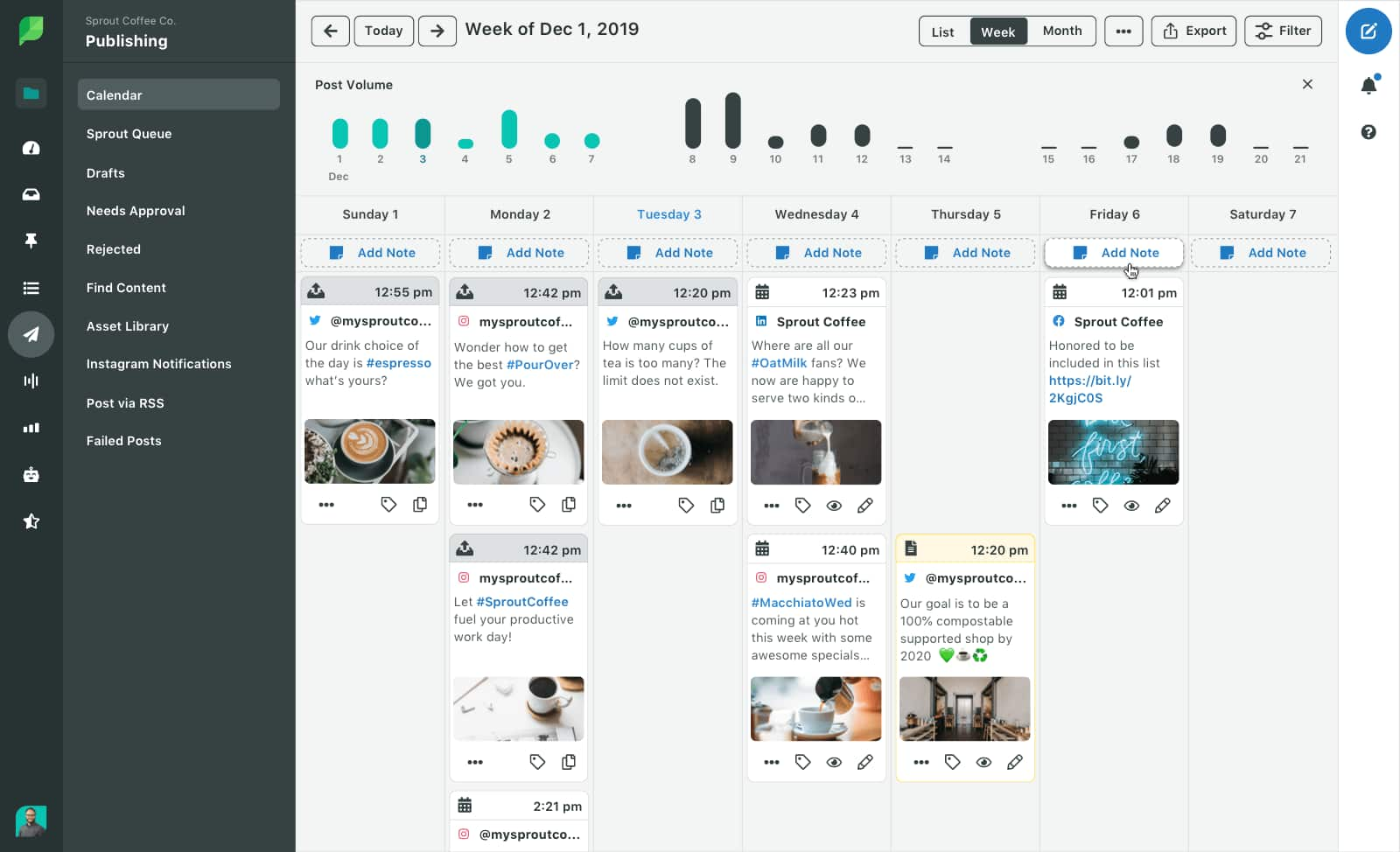
Beyond social media management features, Sprout makes it easy to collaborate with colleagues and customers alike. Our Smart Inbox gives you a bird’s-eye view of all of your social messages so you can respond thoughtfully and in a timely manner.
Oh, and don’t forget about Sprout’s full suite of social analytics.
Optimizing your content’s performance doesn’t have to be a guessing game as Sprout identifies your top-performing posts and the success of your social campaigns. Coupled with robust social listening features, you can uncover trends, hashtags and opportunities to engage with new customers.
2. Loomly
Loomly’s self-described “brand success platform” is a tool that’s ideal for smaller social teams looking to organize and collaborate on content.
Built-in calendars, deadlines and workflows make both scheduling and brainstorming content a breeze. As an added bonus, Loomly actually curates fresh content ideas for users based on trending topics and Twitter conversations.
The clean, no-frills interface is easy to navigate and friendly to users who might not be the most tech-savvy. The affordability of the digital marketing platform is enticing for solo businesses and smaller agencies looking to wrangle their social presence.
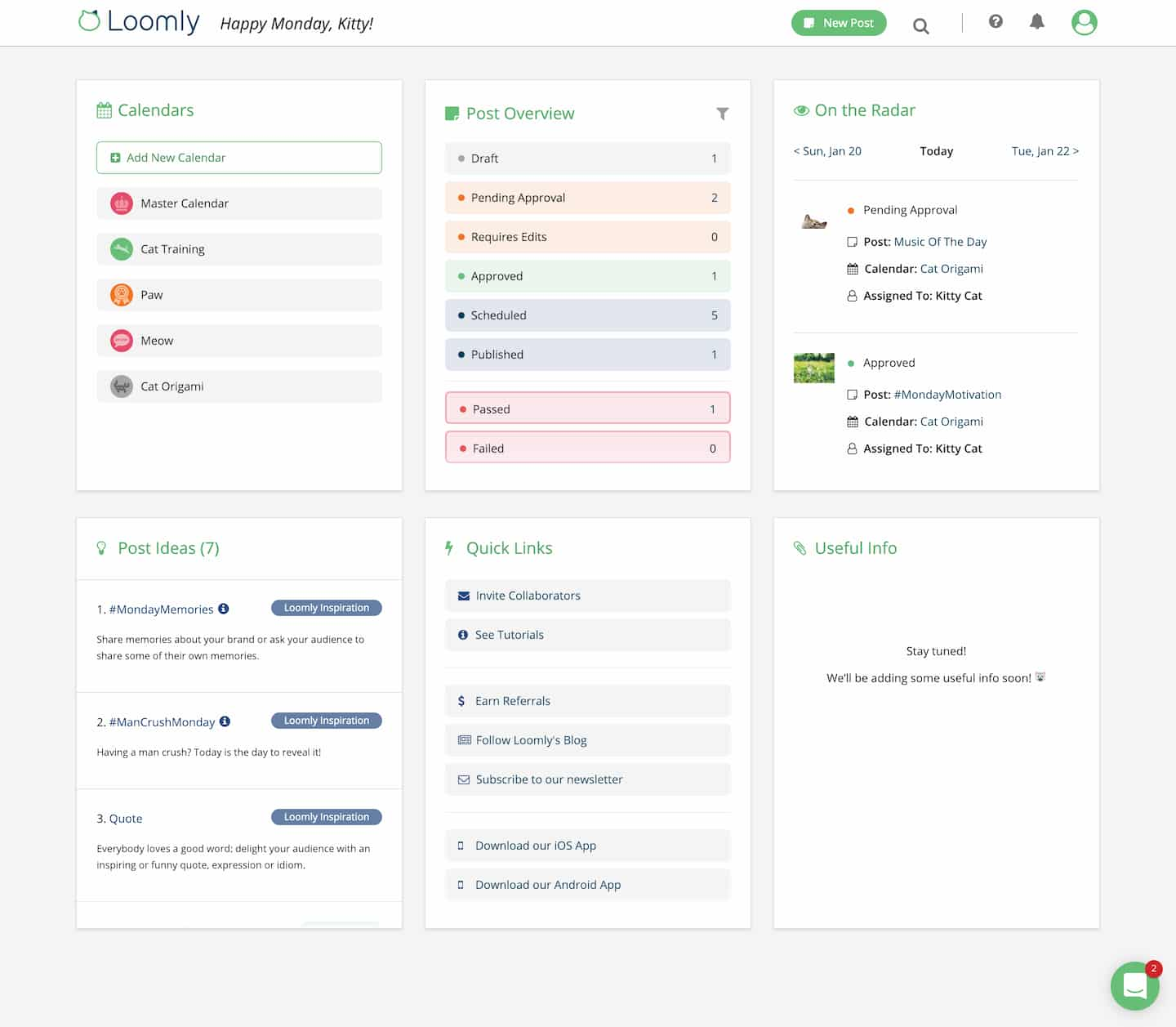
3. Audiense
We’ve talked time and time again about the importance of social listening for identifying trends and potential customers.
Tools like Audiense take listening to the next level by helping companies both identify and segment their social media audiences. Doing so makes it easier to run laser-targeted ad campaigns and likewise dive deeper into your customer personas. Digging into demographics, personality straights and beyond, you’d be surprised at what you can learn from social alone.
Audiense’s platform focuses primarily on Twitter, making it great for B2B brands interested in prospecting and B2C companies looking to understand more about their target audience.
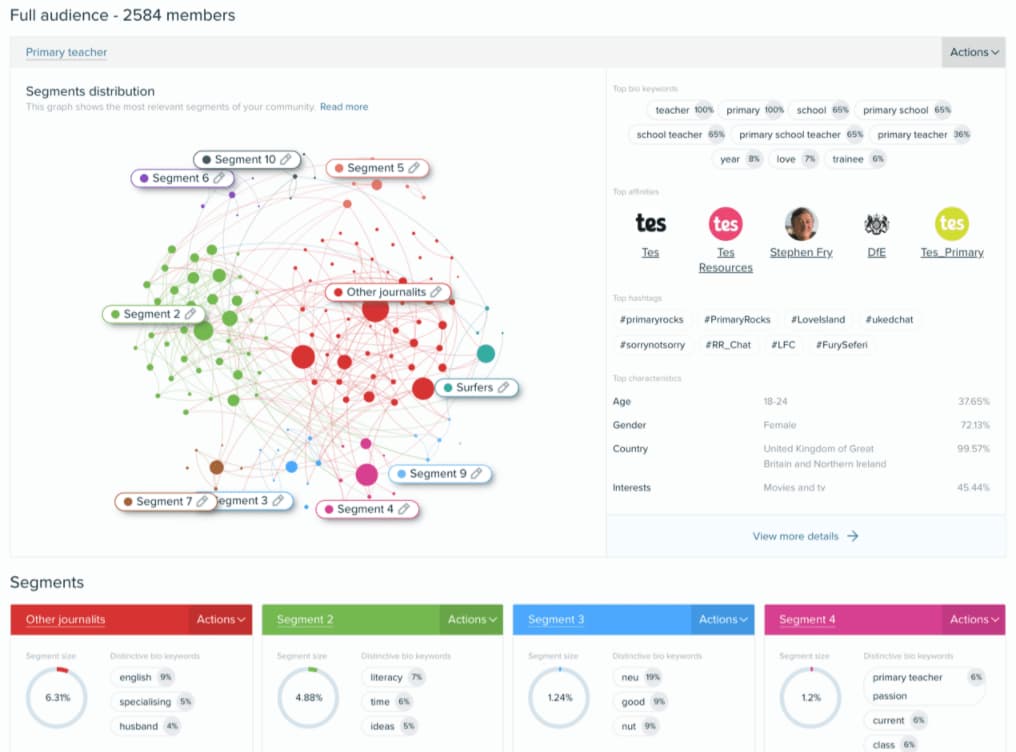
AI-powered marketing tools
AI marketing tools automate repetitive tasks, analyze massive datasets, and predict customer behavior to drive better results. These platforms don’t replace human creativity. Instead, they amplify it by handling the heavy lifting so your team focuses on strategy.
Essential AI capabilities for modern marketers:
- Content optimization: AI analyzes performance data to suggest the best posting times and content formats
- Audience insights: Machine learning identifies patterns in customer behavior and preferences
- Predictive analytics: Forecast campaign performance and ROI before you launch
- Smart automation: Trigger personalized responses based on customer interactions
Sprout Social’s AI-powered features include ViralPost® for optimal posting times and AI-driven social listening that surfaces critical insights about your audience and industry trends.
Email marketing tools
Email represents arguably the most tried-and-tested, scalable marketing channel available to modern companies. As such, email solutions are a staple of Internet marketing software for businesses big and small.
From list-building and improving deliverability to coming up with awesome offer campaigns, let’s look at some tools that can break down your customer data and put a good chunk of your marketing efforts on autopilot.
4. HubSpot
HubSpot Email Marketing combines ease of use with impressive deliverability rates. The platform integrates natively with all HubSpot products and hundreds of popular marketing tools.
Key HubSpot email features:
- Free Plan: Up to 2,000 email sends per month
- Design Tools: Drag-and-drop email builder with ready-made templates
- CRM Integration: Connects seamlessly with the free-forever CRM
The best part? HubSpot reduces complexity with integrations and brings tools together. One of the integrations available is Sprout Social. As a part of Sprout’s care features, you can create and delegate Cases for your customer care team. By connecting Sprout and HubSpot, your team can create, track, manage and resolve issues without leaving the app.
5. SendGrid
SendGrid offers a full suite of email marketing services, many of which are totally friendly to novices and email veterans alike.
For example, the platform offers flexible design options via visual, drag-and-drop editing, coding or a combination of both. In-depth deliverability and performance analytics are also built into SendGrid, cluing marketers in on which messages are performing and what needs work.
We know: there are more email marketing solutions out there than we can count. That said, a big upside of SendGrid is the forever-free plan for up-and-coming businesses as well as scalable pricing that matches your needs as you grow your list.
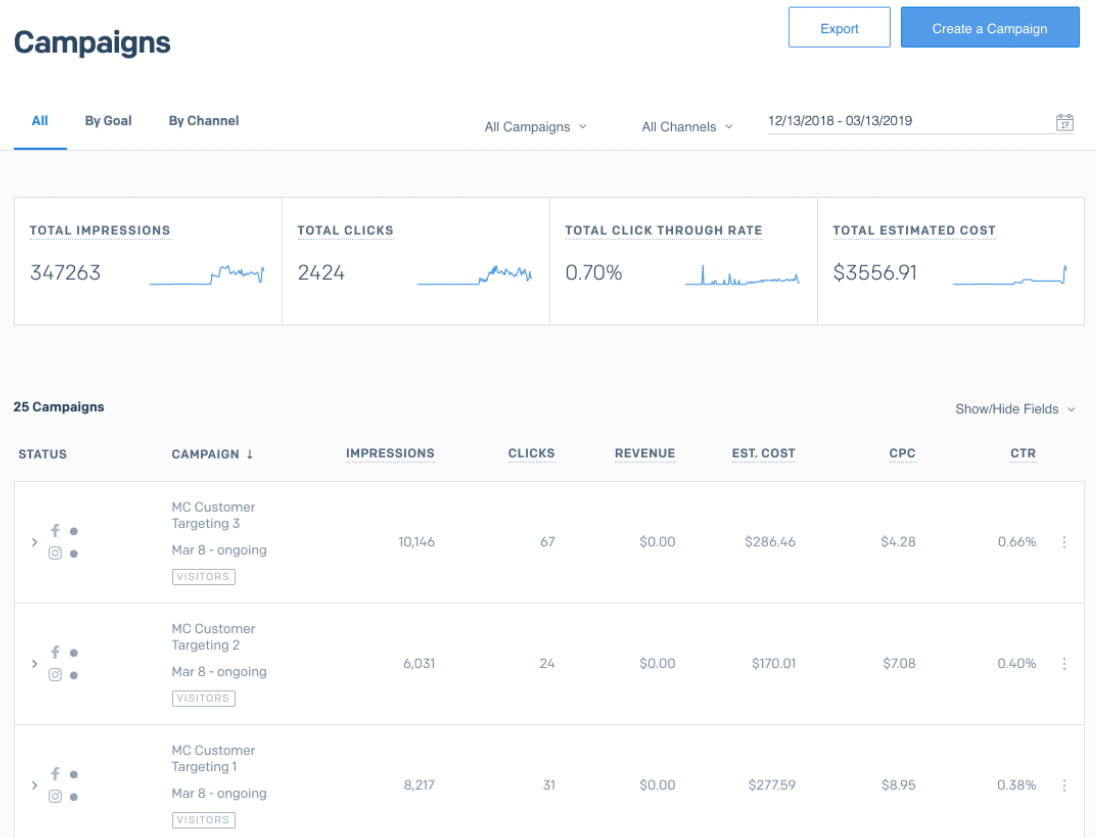
6. lemlist
lemlist is unique among our email marketing tools because the platform is primarily focused on deliverability. Emphasizing the best times to send your messages (and how often) for the sake of more opens and clicks, lemlist is awesome for optimizing your existing campaigns.
Rather than second-guessing your marketing pushes, lemlist can be an eye-opener in terms of how to warm up your list.
Additional features include personalization tools to make your outreach emails sound less spammy and follow-up email sequences to encourage more replies from cold prospects.
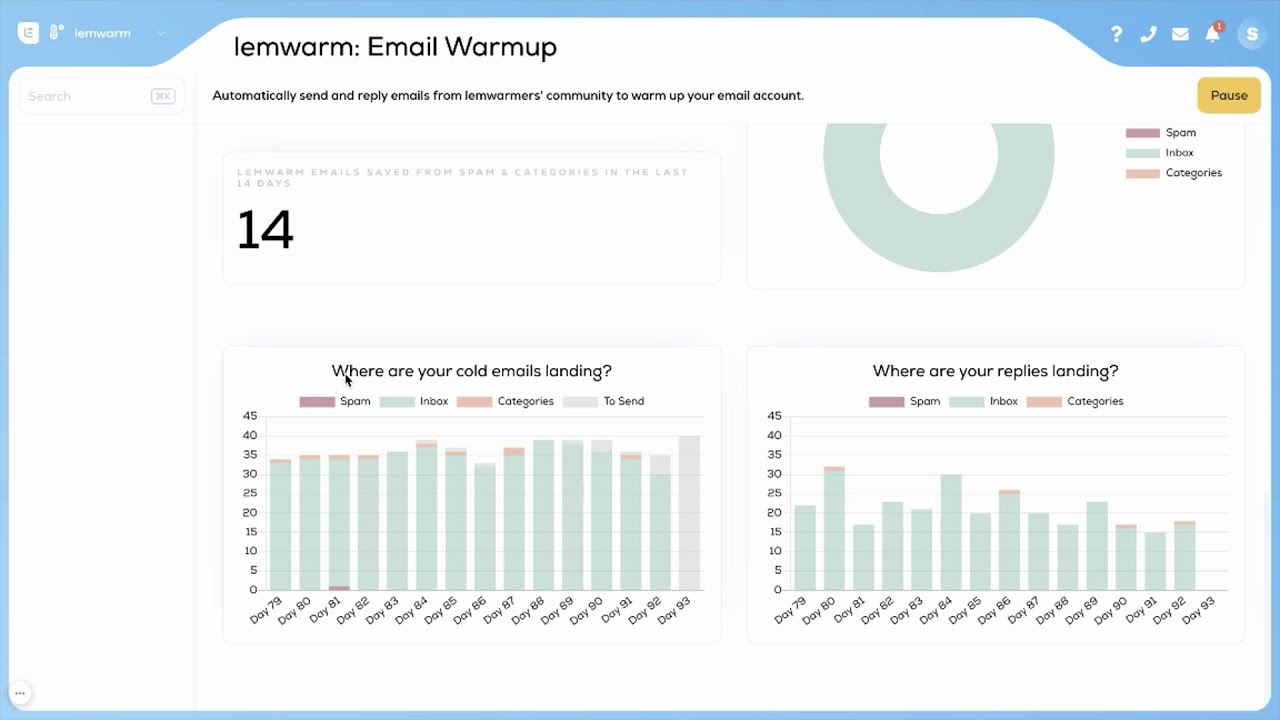
7. Moosend
Moosend is among the most user-friendly and affordable of our digital marketing tools, representing a surprisingly robust email solution for those just beginning to build their list.
Codeless campaigns, simple automations and easy-to-read reporting are all built into the platform. Paid users can also take advantage of landing page features, including mobile popups and countdown timers.

SEO (search engine optimization) tools
Fact: over half of all website traffic comes from search queries.
As the digital landscape becomes increasingly competitive, anything companies can do to increase their search presence is a plus. Although SEO might be daunting, especially to up-and-coming businesses, there are plenty of online marketing tools to help you uncover search opportunities and optimize your existing search engine efforts.
8. Ahrefs
Ahrefs is the gold standard when it comes to brainstorming keyword ideas and opportunities to rank.
The platform’s site explorer lets you check any URL’s top organic keywords, while also estimating how much traffic a competitor receives for any given search term. You can also identify a site’s top-performing content and sources of backlinks.
In short, Ahrefs is a fantastic tool not only for competitive analysis but also for making sure that your existing content is up to snuff for search.
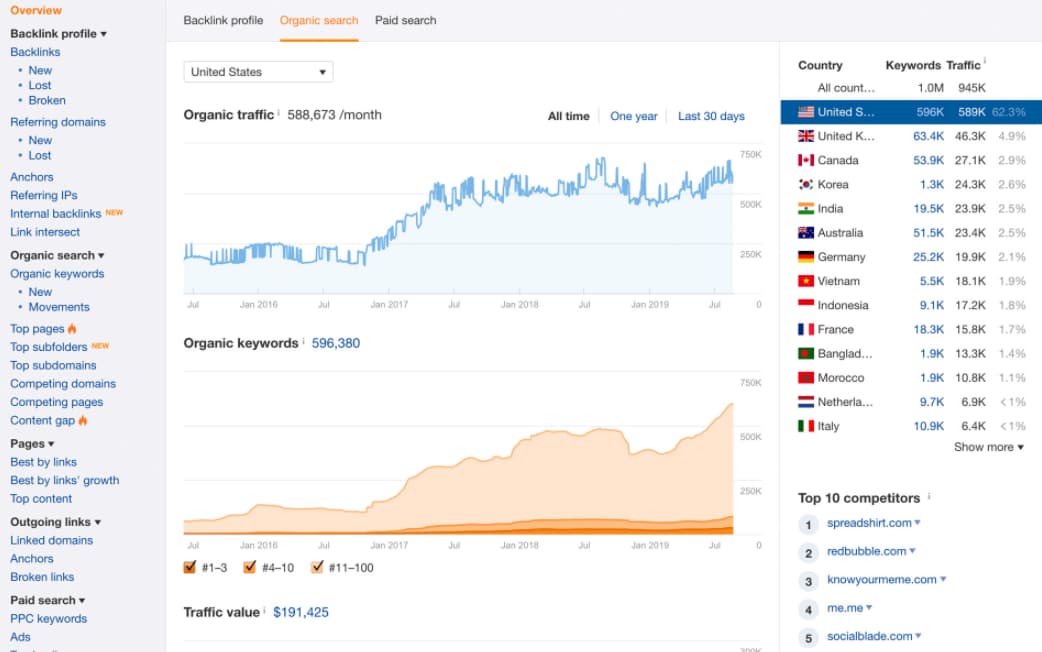
9. Clearscope
Now, let’s say you’re interested in capitalizing on keyword opportunities and optimizing your existing content. That’s where Clearscope comes in.
Particularly useful for content writing, the platform provides a detailed editor to recommend keywords, headers and readability to help you write (or rewrite) high-ranking, well-balanced blog posts.
Whether you’re creating a content strategy from scratch or refreshing your existing blogs, Clearscope covers every nook and cranny of search optimization.
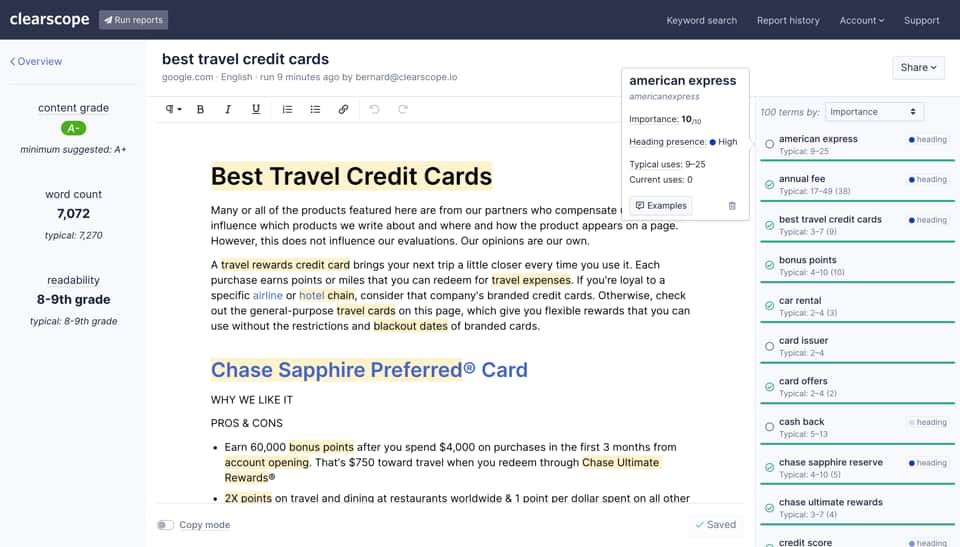
10. SEMrush
Another staple SEO tool, SEMrush allows you to track the position of your priority keywords and likewise explore new terms to rank for.
The tool’s breakdown of keyword ideas, difficulty and variations are great for brainstorming content ideas and identifying search intent, too.

Analytics and measurement tools
Analytics tools transform marketing activities into measurable business outcomes. They connect daily social media efforts to revenue, lead generation, and brand awareness metrics that matter to executives.
Top analytics platforms for comprehensive measurement:
| Tool | Best For | Key Features | Integration Strength |
|---|---|---|---|
| Sprout Social | Social media analytics | Cross-platform reporting, ROI tracking, audience insights | Native integrations with all major social platforms |
| Google Analytics 4 | Website performance | Traffic analysis, conversion tracking, audience behavior | Universal tracking across Google products |
| Mixpanel | Product analytics | Event tracking, user journey analysis, retention metrics | Developer-friendly API integrations |
Sprout Social’s analytics go beyond vanity metrics to show how social media drives business results, with customizable reports that speak to C-level executives.
Conversion optimization tools
The smallest changes can make the biggest difference when it comes to getting people to convert on-site.
Just changing the color of your call-to-action button can spell the difference between scoring a free trial sign-up and someone bouncing. Among the digital marketing tools in your toolbox, conversion optimization software can clue you in on low-hanging opportunities to increase your revenue.
11. Unbounce
Unbounce is an amazing tool for quickly building, tweaking and publishing new landing pages to test. Built-in A/B testing and variant analytics can answer directly which creatives, calls-to-action and additional page elements are working (and which aren’t).
Even if you’re not much of a designer, you can use Unbounce’s proven landing page templates as a jumping-off point and then modify them to fit your style. The platform’s analytics spell out clearly which landing page variants are your top performers.

12. Optimizely
Emphasizing landing page experiments, Optimizely combines tools for visual creation and audience targeting to quickly run tests on different segments of your audience.
A no-code platform that allows you to test both major and minor edits to your pages, fine-tuning your site for performance, doesn’t have to be a huge undertaking.
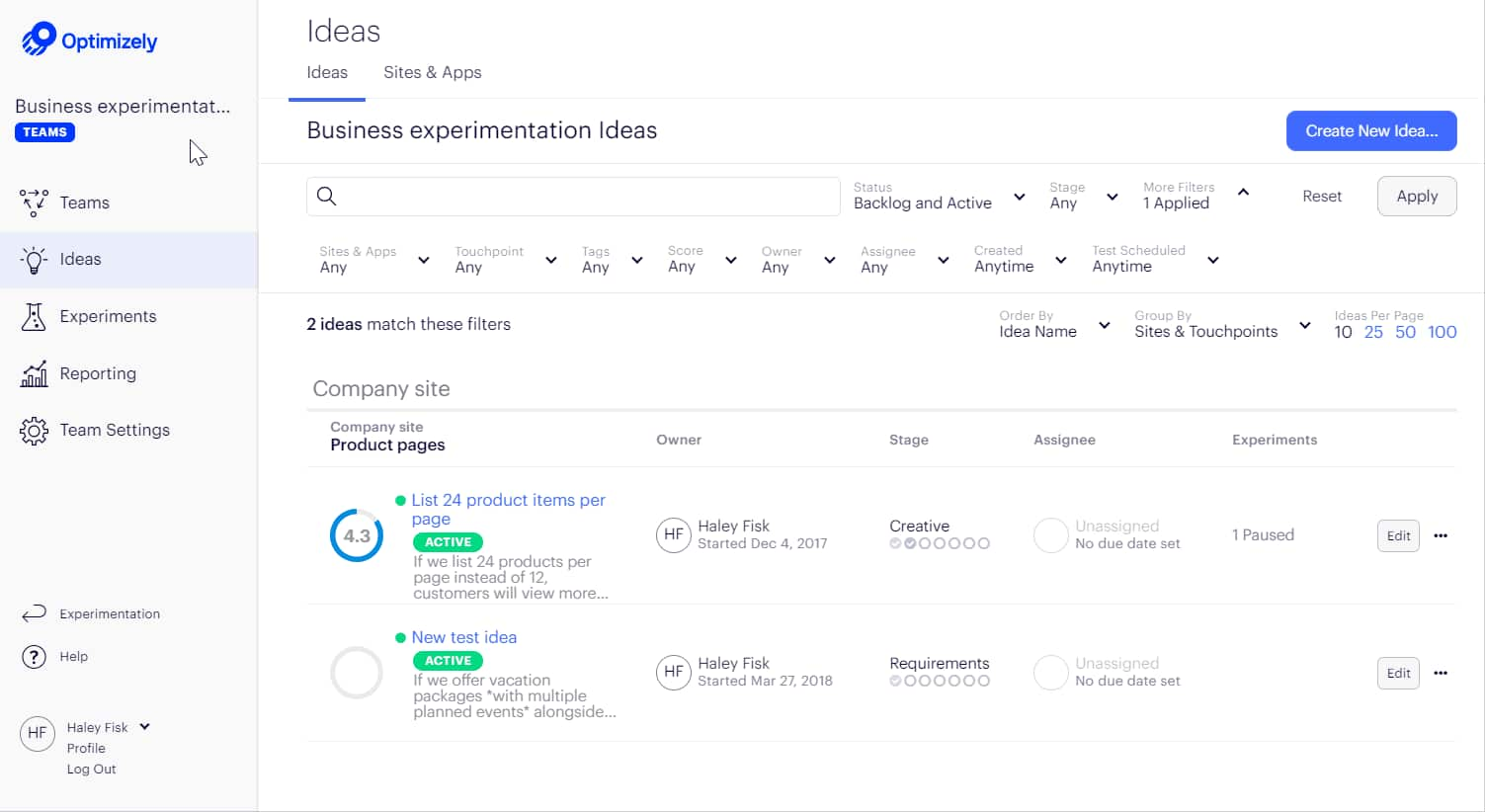
13. Hotjar
Hotjar’s platform provides a real-time visual record of your visitors’ actions and behaviors on-site.
Through heatmaps that clue you in on where people are (or aren’t) clicking. Synced to actual video recordings of your visitor’s journey, you can quite literally see what needs to be tweaked at a glance.
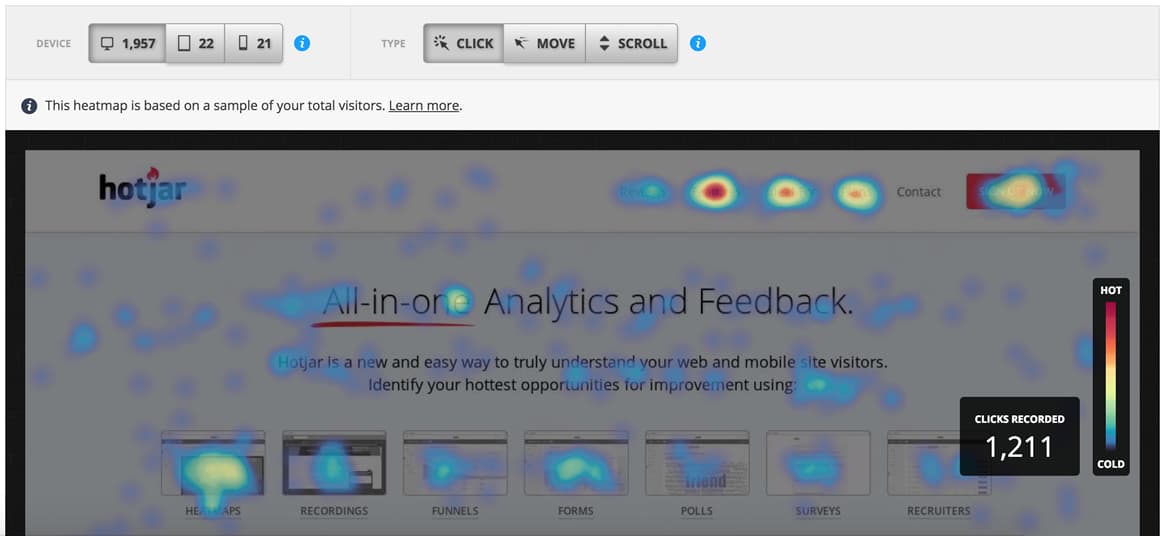
Lead enrichment tools
It’s well-documented that the majority of website visitors fail to provide enough data after leaving your site.
Thankfully, there are business intelligence tools out there to help you better understand your leads and highlight key information to reach out to them once they’ve shown interest. Particularly powerful for B2B marketing, lead enrichment tools supercharge your prospecting and outbound marketing pushes by giving you a more holistic view of your traffic.
14. Clearbit
Using 100+ sources, including Salesforce and additional marketing platform data, Clearbit creates an up-to-date profile of your leads to make your outreach efforts go more smoothly. The details gathered include company, role and company size, just to name a few.
Rather than dig for details or rely on outdated information, the platform regularly updates itself every 30 days to ensure that your data stays fresh. This allows you to prospect with confidence and save serious time in the process.

15. Datanyze
Similar to Clearbit, Datanyze also uncovers crucial contact information about your on-site leads to fill out your digital rolodex. The platform also works brilliantly for prospecting on LinkedIn by pulling social data on decision-makers, too.

Landing page and lead capture tools
As our attention spans shrink, making a conscious effort to reel in visitors once they land on-site is crucial. Marketing platforms focused on lead capture ensure that your traffic doesn’t go to waste and visitors are more likely to take action. When done right, the end result is more leads and conversions.
16. OptiMonk
OptiMonk’s platform allows businesses to grab the attention of customers and prevent them from bouncing through personalized pop-ups.
With an emphasis on lead capture and exit intent messages, the platform’s behavior-based targeting means that your pop-ups don’t have to be disruptive.
For example, OptiMonk encourages users to segment their marketing messages and serve them only when they make sense. From returning buyers to first-time window shoppers, the platform empowers you to create campaigns that speak to all of your customers rather than treat them as one-size-fits-all.
The upside of OptiMonk is that it’s known for its ease of use. Boasting a ton of templates with established average click-through rates, brands can customize their messages based on pop-ups that are proven to be effective.
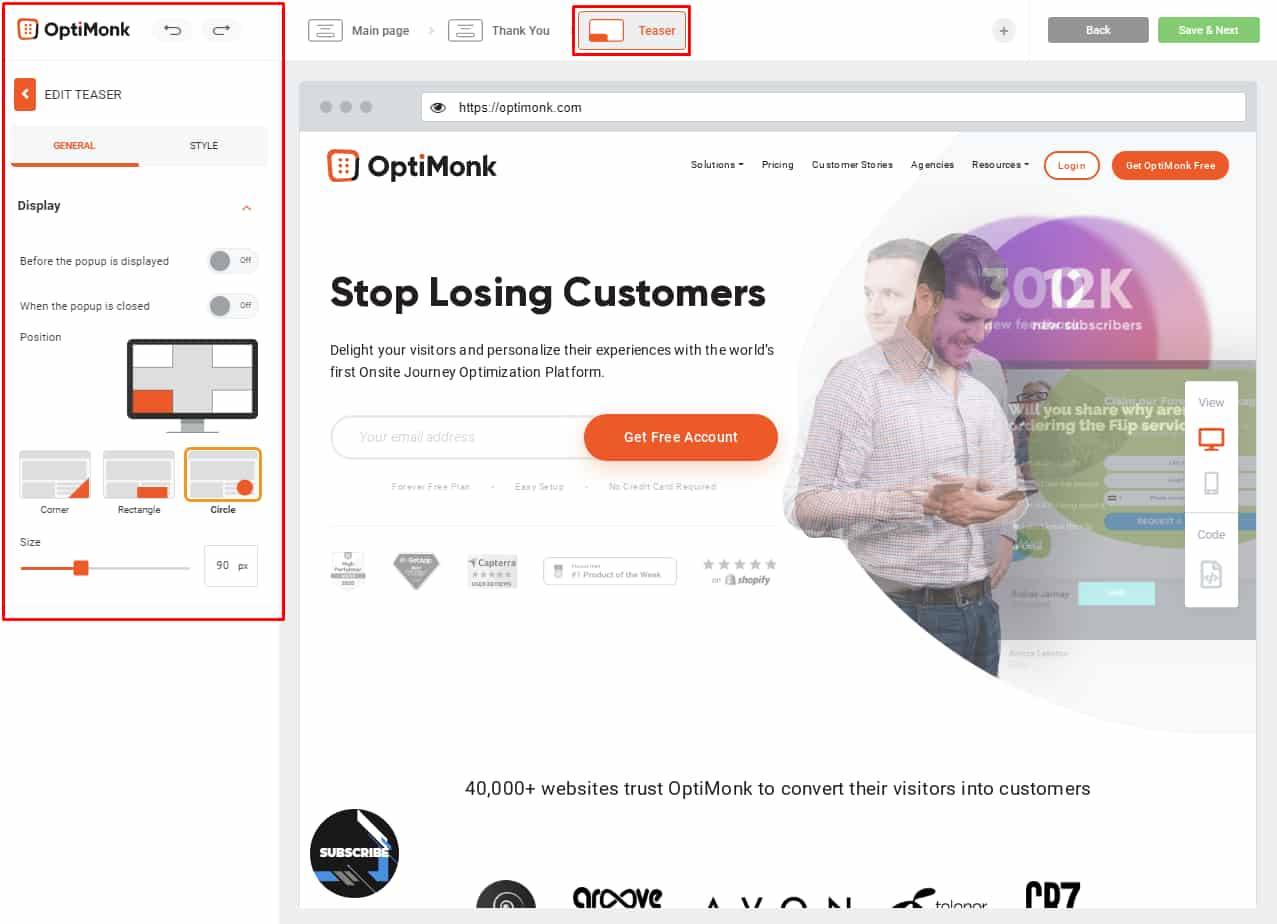
17. Typeform
Typeform is a sleek tool for marketers looking to create attractive, minimalist forms.
Unlike more traditional pop-ups, Typeform’s intake forms are seriously stylish and don’t feel like ads at all. The platform’s simple editor and easy embeds are a nice added bonus, as is the ability to create quizzes and interactive forms.
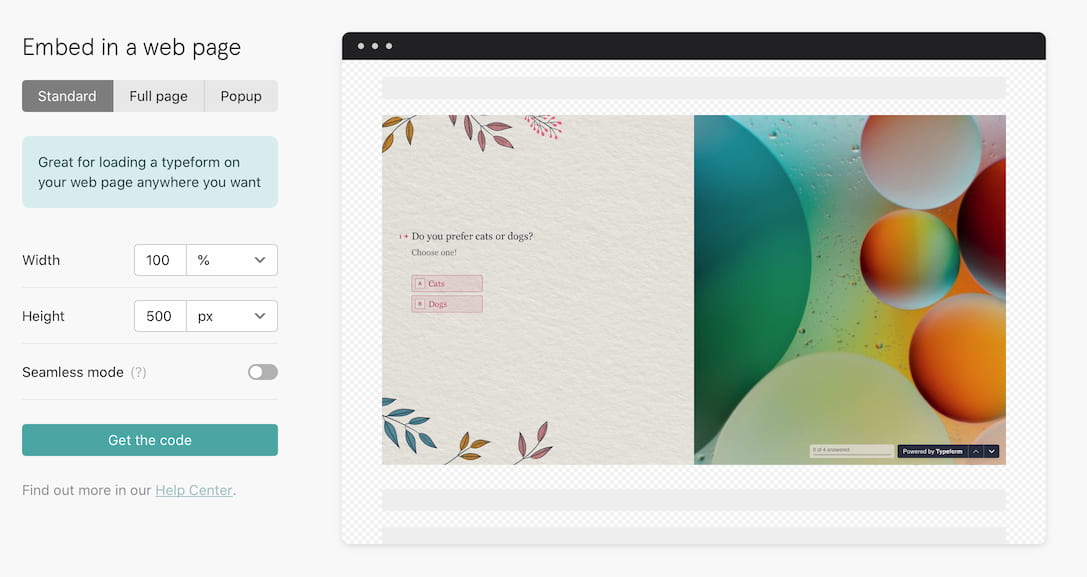
18. MailMunch
A hybrid email marketing and landing page tool focused on list-building, MailMunch offers several engaging form types and emails to send to leads once they’ve opted-in.
The platform lets you segment your audience based on factors such as how often they buy and customer demographics. Additionally, their goal-based form-builder is straightforward and lets you work from a variety of templates.

Graphic creation tools
Infographics. Memes. Graphs and graphics. The list goes on and on.
Visuals are the cornerstone of social marketing and branding at-large. If you don’t have the budget for a designer or are running a DIY business, digital marketing tools such as Canva have become the go-to for producing eye-catching visuals.
Visual content drives 94% more engagement than text-only posts. Whether you need infographics, social media graphics, or branded templates, the right design tools transform amateur visuals into professional assets.
Essential graphic design capabilities:
- Brand consistency: Templates that maintain your visual identity
- Multi-format export: Resize designs for different social platforms
- Team collaboration: Share brand assets across your marketing team
- Asset management: Organize and reuse approved visuals
Pro tip: Store your brand-approved graphics in Sprout Social’s Asset Library to ensure consistent visuals across all your social campaigns.
19. Creatopy (formerly Bannersnack)
Creatopy is a graphic creation tool akin to Canva, but emphasizes quite a few features specific to marketers.
For example, the platform’s design sets and brand kits allow you to seamlessly work with fellow marketers and keep your brand creatives organized. This is particularly useful for agencies managing multiple clients or social accounts.
Meanwhile, the ability to edit the same design within multiple formats (think: desktop banner versus mobile) in a single click is a huge time-saver.
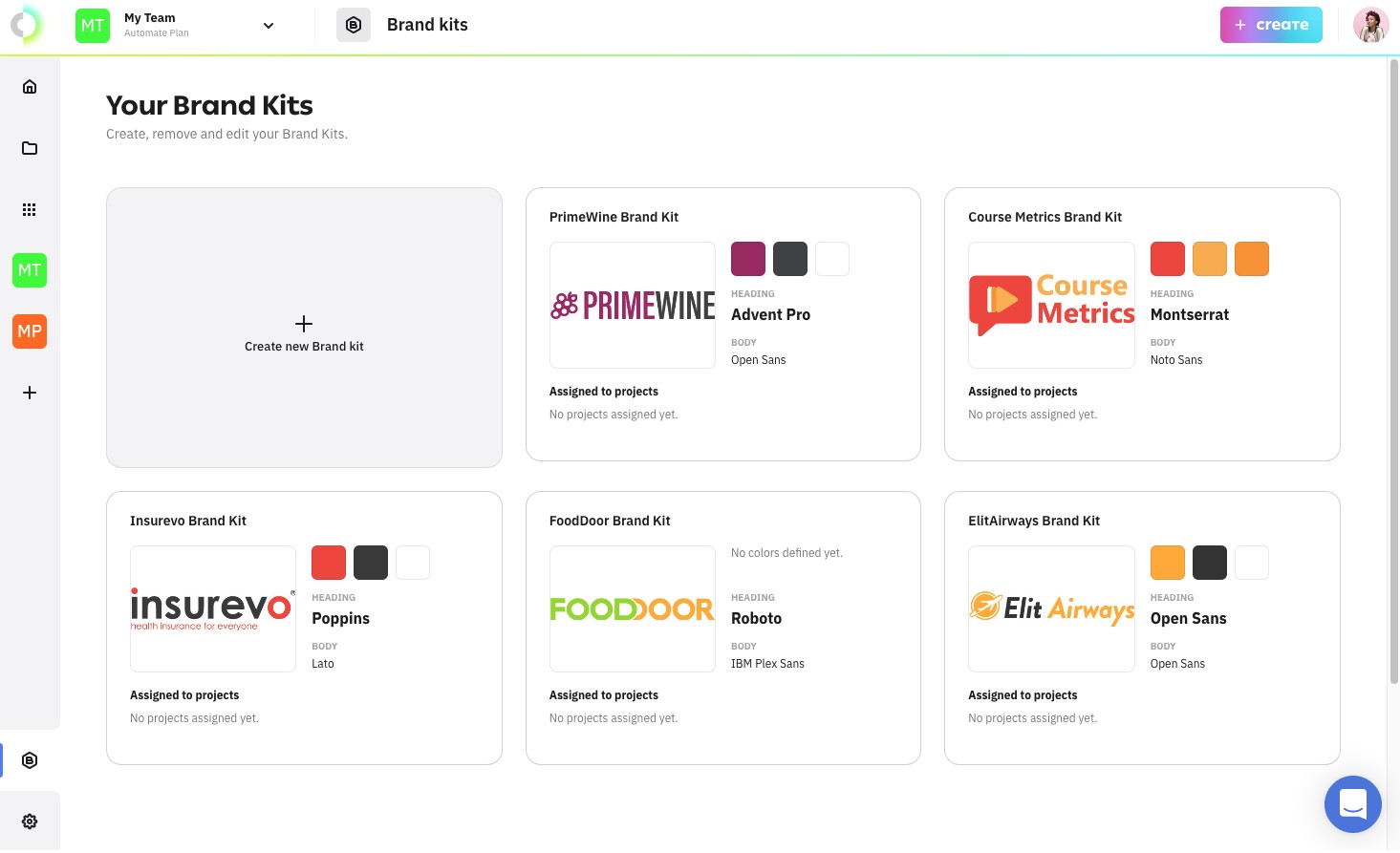
20. Visme
Visme’s platform is focused primarily on creating presentations and data visualization.
Because infographics and fresh data are among the most-shared types of content on social media, Visme is ideal for anyone frequently publishing research to platforms like Twitter or LinkedIn.
Beyond straight-up graphic creation, the platform lets you pull data from external sources (think: spreadsheets) to make presentation creation a snap.
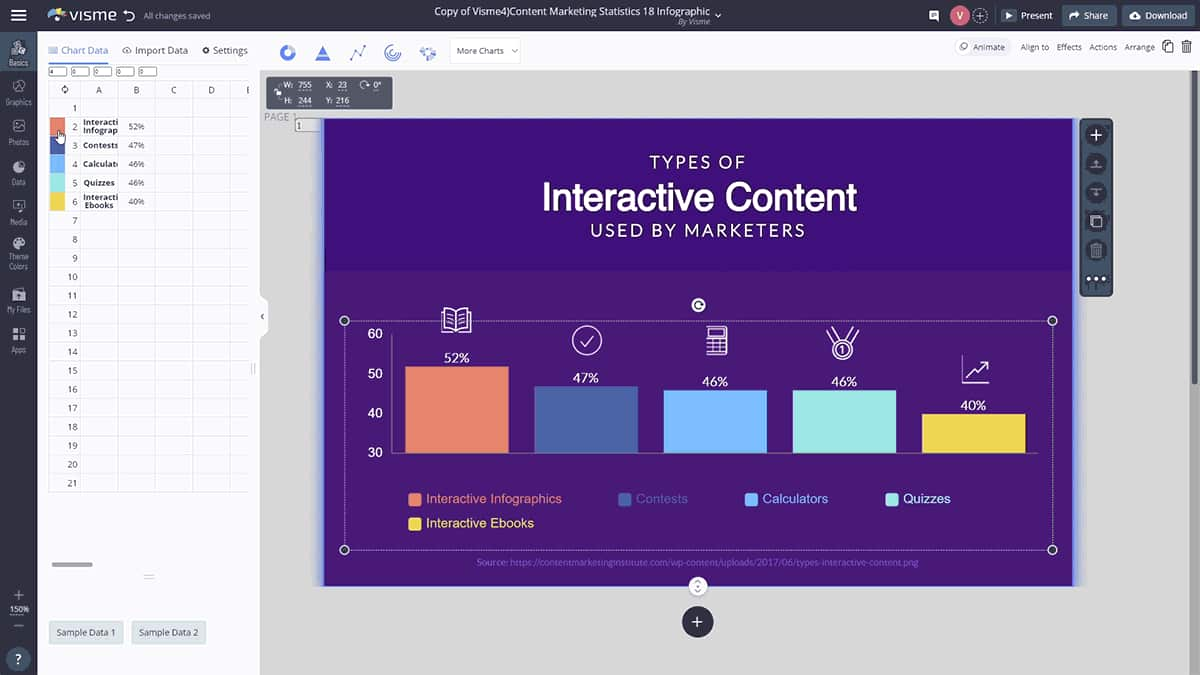
21. Venngage
Venngage is another graphic creator with an emphasis on infographics. With spreadsheet imports and hundreds of chart configurations, you can customize your infographics however you want. Customize any infographics based on your branding with tons of built-in graphics to choose from.
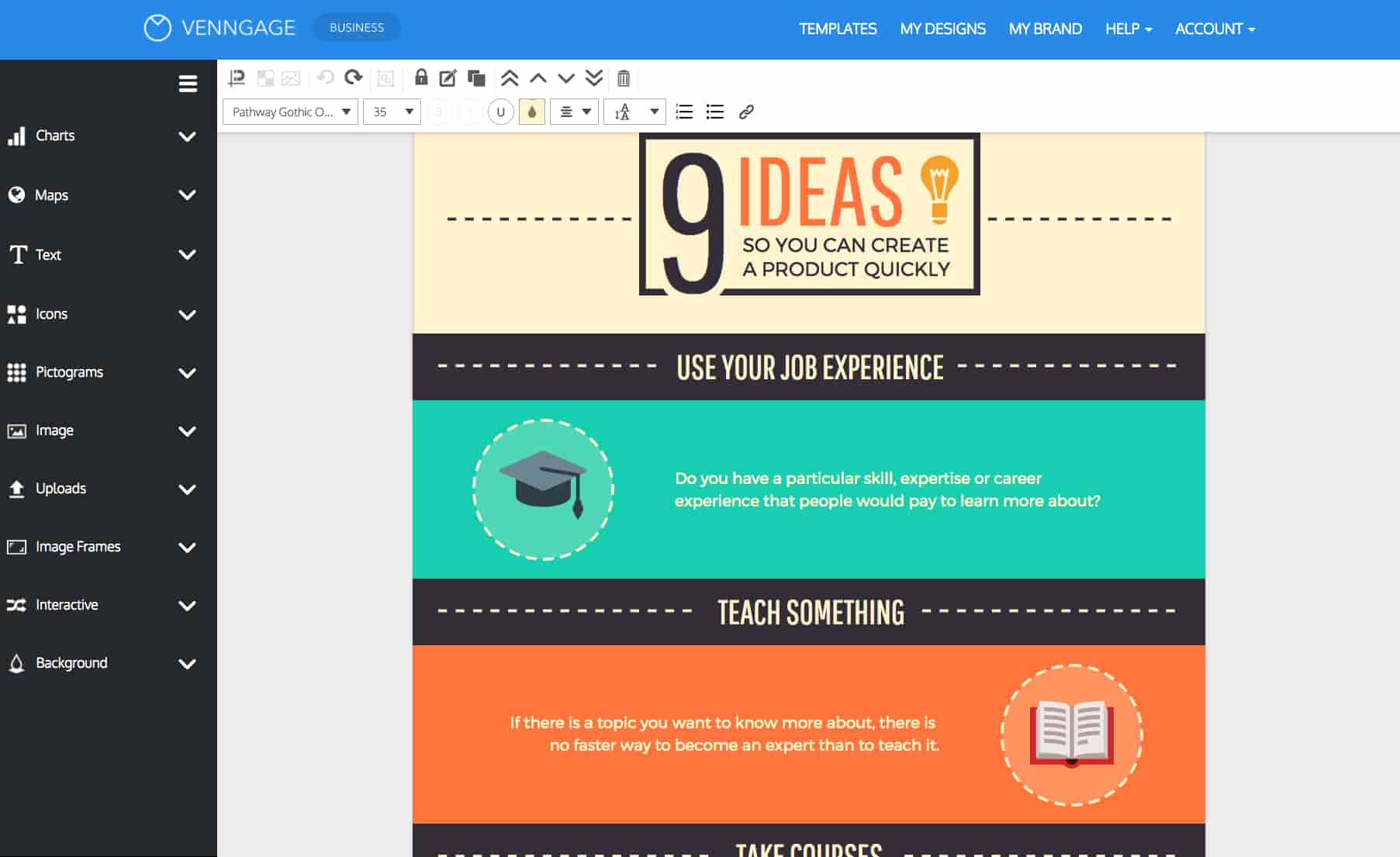
Building your digital marketing tool stack
Your marketing stack determines your team’s efficiency and results. The best approach combines specialized tools with a powerful central platform that connects everything.
Essential criteria for tool selection:
- Integration capability: Does it connect with your existing tools?
- Scalability: Will it grow with your business needs?
- Team collaboration: Can multiple users work efficiently together?
- Data consolidation: Does it eliminate reporting silos?
- ROI measurement: Can you track business impact clearly?
Sprout Social serves as the central hub that connects your social media efforts with broader marketing goals. Start your free trial to see how unified social media management transforms your results.
Get started faster with our social media templates that align your campaigns with business objectives from day one.

Share